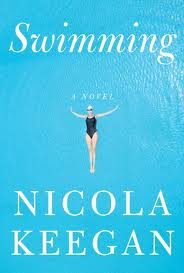Swimming: Voice, voice, plus some prickly humor

Now that I’m done reading a scholarly book (or more) a day for my PhD exams, I get to read for fun again! Last week I listened to Nicola Keegan’s Swimming in several galloping gulps. This book has amazing voice and dark humor.
Okay, so read the synopsis and you see that it’s a book about a (fictional) Olympic gold medalist in swimming. Hmmm. Snooze. Sports bio? Blech. But not so fast… the thing that some crankypants on goodreads don’t like–that the book is not really all “about” swimming–is what makes it work for me. Swimming forms an exquisite backdrop for what is really the story of being Philomena, seeing the world as she sees it. There are healthy doses of family drama. I’d recommend it for anyone who liked Jenny Downham’s Before I Die or for people (like me) who can listen to that sad Sulfjan Stevens cancer song (“Casimir Pulaski Day”) over and over for a good cry.
I could cite the Kirkus review’s final line to sum up my overall reaction: “Flags a little at the finish line, but nonetheless well worth plunging into.” But when you put it like that… well, it makes it sound like a book a lot less worth reading than it really is. So I’ll go with the final line of the Publishers Weekly review, which is what convinced me to check out the book in the first place: “It’s worth reading for the prose alone.”
It’s true that the novel doesn’t really end, it sort of just sputters to a stop. Okay, that’s not awesome. I wish Keegan and her editor had worked it over one more time to find the right final note, the right final movement.
BUT let’s remember how hard endings are and focus on all the (many!) things this book gets right. I mean, the speaker Philomena is brutally honest and funny in a way I only dream of. Here’s a bit to give you a taste, but really the book is so much better because we get to hear this girl on dying, nuns, sex, sugar, and much more.
Leonard wants me to be a mini-Bron, but I won’t. He wants me to be an intellectual success, skipping entire grades like rope, wants me to bring home prizes from French clubs, wants to display my medals, ribbons, shiny cups from tricky debates and interscholastic spelling bees. He wants me to look out at the world, curious and smart, then he would like to talk to me about it, over dinner. He’s not the least bit interested in how fast I swim, barely listening when I explain how I lowered my personal best once again. He reminds me, on Sunday afternoons, during short trips to the grocery store. You’re eleven now. He reminds me when he picks me up, when he drops me off, when we fly, his voice cutting through the static. Well into the double digits. He reminds me during commercials, when he’s boiling water for tea. Junior high is serious business. But I am so overinformed that the end is coming, I don’t believe it, just keep hoping that something miraculous will happen and I will be back, like Jesus. I am shocked, sickened, stunned, and amazed when I find myself standing by the pool on the last day of my last workout of the last season. I have no idea how right I am when I get dramatic: Pieces of my heart are being ripped up and, and, and it’s all downhill from here. I just know it. It’s all downhill from here, snot gushing out my nose as I weep myself into convulsions that get the Cocoplat and the few girls who can still stand me going. Coach Stan purses his lips, clicking his stopwatch on, then off.
Really, get your butt to the library and check this one out. I recommend it in audiobook. FYI, Philomena is a teen for most of the book, but it starts with her infancy and goes on into her twenties. Not your usual YA range, but then it’s not marketed as YA.




